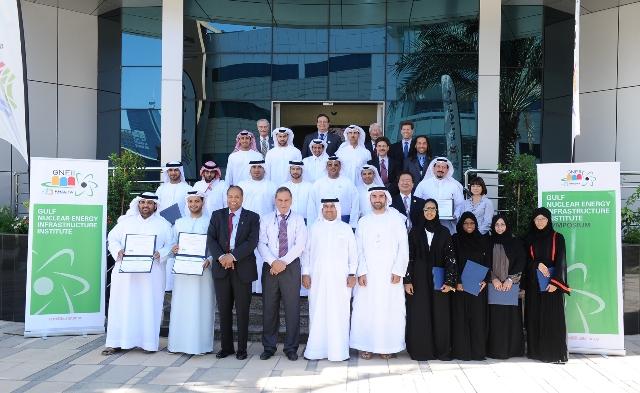
The Gulf Nuclear Energy Infrastructure Institute (GNEII) held a two-day symposium and graduation ceremony on the Abu Dhabi campus of Khalifa University on October 9 and 10 to mark the completion of their 2012 program.
The symposium focused on nuclear safety, security, and safeguards and featured the eleven capstone projects completed by the GNEII fellows. The 2012 GNEII class consisted of 26 fellows from five different countries. The capstone projects were the culmination of the 16-week GNEII course. Four of the capstone projects are already slated for publication in international journals.
The symposium was opened by Ambassador Michael H. Corbin, the US ambassador to the United Arab Emirates. Also in attendance were representatives from the US Department of Energy, US Department of State, Sandia National Laboratories, Khalifa University, the Emirates Nuclear Energy Corporation (ENEC), the Emirati Federal Authority for Nuclear Regulation (FANR), the Emirati Critical Infrastructure and Coastal Protection Authority, and the International Atomic Energy Agency (IAEA). TAMU was represented by Nuclear Engineering Interim Department Head Dr. Yassin Hassan, NSSPI Deputy Director Dr. David Boyle, and GNEII Faculty Coordinator Dr. Michael Schuller.
A key note address on a “Culture of Safety” was given by a senior member from ENEC, and the symposium program included a presentation by Dr. Ali Boussaha from IAEA on the IAEA’s Technical Cooperation Department activities in the Middle East and a discussion on “3S integration in nuclear regulation in UAE” by Dr. Christer Viktorsson, Deputy Director General of FANR. GNEII alumni, Mr. Wael Al Hashimi, who is currently working with CICPA, also spoke to the graduates.
According to GNEII manager Abdelaziz Al Madhloum, “Programs like GNEII are vital to furthering the region’s quest to develop a peaceful nuclear program, as well as become an intellectual and academic hub in the Gulf area.”
GNEII was established in 2011 as a Khalifa University institute housing a regional education program offering both classroom instruction and hands-on experience in topics related to nuclear energy safety, security, safeguards and nonproliferation. Conceived as a response to the growing interest in nuclear energy among Middle Eastern nations, GNEII strives to promote a nuclear energy security and safety culture in countries in the region with nascent nuclear energy programs. The program is sponsored on the US side by the International Nuclear Safeguards and Engagement Program (INSEP) at the US Department of Energy / National Nuclear Security Administration, and the Partnership for Nuclear Security (PNS), which is a program of the US Department of State’s Office of Cooperative Threat Reduction. NSSPI has worked with Sandia National Laboratories to develop the curriculum and supply the instructors for the modules.